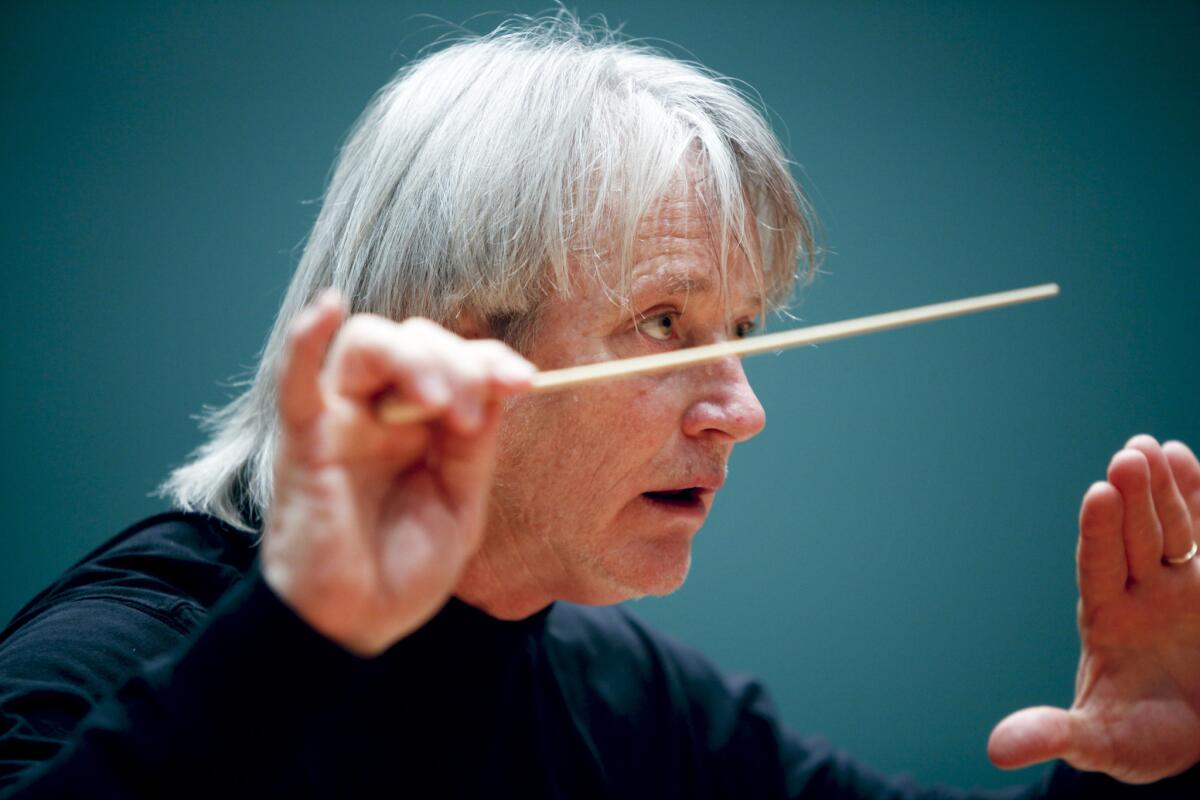Review: A riveting Shostakovich program by the Pacific Symphony

- Share via
It was inevitable that the tormented Shostakovich would someday be the focus of one of the Pacific Symphony’s multidisciplinary “Music Unwound” projects.
Although Shostakovich has been “unwound” innumerable times since Solomon Volkov’s “Testimony: The Memoirs of Dmitri Shostakovich” came out in 1979, his case remains endlessly riveting -- and there was plenty to ponder at Renée and Henry Segerstrom Concert Hall on Thursday night.
The Chapman String Quartet played the autobiographical Quartet No. 8 in front of a cardboard cutout of the Kremlin in the lobby before the concert, bravely trying to overcome the hubbub of the crowd.
Carl St.Clair led a rollicking, turbulent orchestral interlude from the opera that drew the wrath of Josef Stalin, “Lady Macbeth of Mtsensk District,” followed by the coda of the Symphony No. 5 and its implied message of jubilation under threat.
PHOTOS: Arts and culture in pictures by The Times
Actor David Prather read from “Testimony,” zeroing in upon the key passages that changed Western perceptions of what Shostakovich’s music really meant. And after the concert, Volkov himself joined St.Clair, pianist Alexander Toradze, artistic advisor Joseph Horowitz, and members of the audience onstage for probing reminiscences and theories about Shostakovich and Stalin.
Yet one wonders whether we in the 21st century are experiencing more powerful Shostakovich interpretations than previous generations did. St.Clair and the Pacific Symphony had the basic outlines and current notions of tempo of the Symphony No. 10 well in hand, and the performance was in general pretty good.
What didn’t come through was the feeling of the scherzo (said to be a portrait of Stalin) nearly running off the rails with ferocity, nor the urgency and anguish of the first movement stretched nearly to the point of pain. I thought of some of the earliest recordings of the Tenth that were shot through with brooding and fury -- those of Dimitri Mitropoulos and, of all people, Herbert von Karajan. They got the message somehow, without the benefit of our hindsight.
For his part, Toradze played the Piano Concerto No. 2 with an ear for extremes -- applying either the lightest of featherweight touches or bombs-away fireworks, taking the Andante movement at a hold-your-breath slow tempo that became Molto Adagio by the close. This performance was different; what it could have used was more satire and fun.
Carl St.Clair, Alexander Toradze and the Pacific Symphony. Renée and Henry Segerstrom Concert Hall, 600 Town Center Drive, Costa Mesa; 8 p.m. Saturday; $25-$185; (714) 556-5799 or www.pacificsymphony.org
ALSO:
Todd Robbins, Teller turning ‘Play Dead’ stage show into TV series
‘The Birthday Party’ revival postponed at Geffen Playhouse
Soccer ball as globe in ‘Fútbol: The Beautiful Game’ at LACMA
More to Read
The biggest entertainment stories
Get our big stories about Hollywood, film, television, music, arts, culture and more right in your inbox as soon as they publish.
You may occasionally receive promotional content from the Los Angeles Times.










